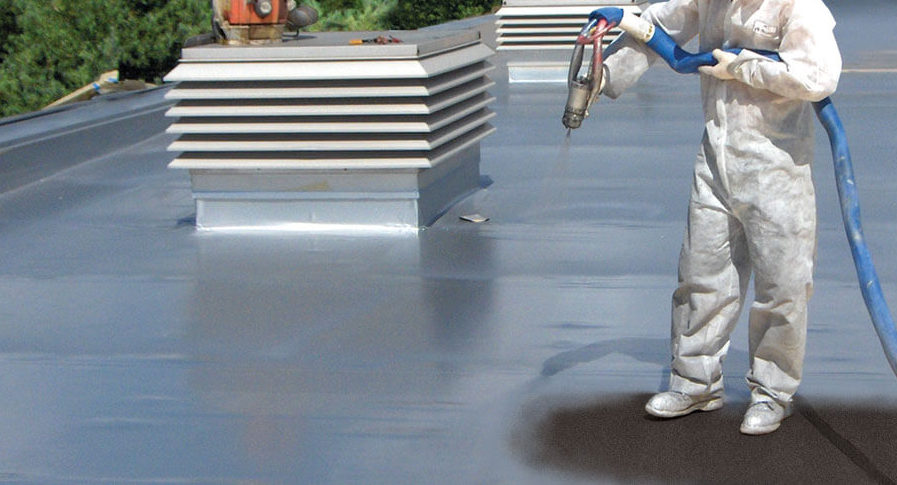Polyurea
(Spray Polyurea Waterproofing Coating)
WHAT IS POLYUREA?
Polyurea coatings are rapidly becoming the go-to protective solution for a wide range of industries and applications. These revolutionary coatings offer incredible benefits and durability, protecting valuable assets from the harshest elements and stains, ensuring they last longer and require minimal maintenance.
Thank you for reading this post, don't forget to subscribe!Polyurea is an elastomer material procured from step-growth polymerization, which involves combining synthetic resin and reactive isocyanate materials. Thus, the result of an isocyanate part with a resin blend part through the step-growth method of polymerization produces polyurea. Various formulations of resins and isocyanates can produce the desired setting time, water resistance, pigmentation, flame-hindering qualities, and other unique characteristics.
A hybrid coating is a polyurea blended in polyurethane in calculated proportions. The hybrid coating presents specific physical properties of pure polyurea at a lower price than pure polyurea alone.
ALIPHATIC POLYUREA AND AROMATIC POLYUREA
Aliphatic polyurea and aromatic polyurea are two types of polyurea coatings that differ in their chemical makeup and properties. Aliphatic polyurea is made using aliphatic isocyanates, while aromatic polyurea coat it is made with aromatic isocyanates. One of the main differences between the two types of polyurea is their UV stability. Aliphatic polyurea is highly resistant to UV radiation, making it an ideal choice for outdoor applications, while aromatic polyurea is more susceptible to fading and degradation when exposed to sunlight. In addition to extra protection, aliphatic polyurea has superior color retention, maintains its gloss and clarity over time, and is less likely to yellow compared to aromatic polyurea.

Another difference between the two types of polyurea is their chemical resistance. Aliphatic polyurea has excellent resistance to chemicals, such as acids, solvents, and fuels, while aromatic polyurea is not as resistant to these substances.
In terms of physical properties, aliphatic polyurea is more flexible, smooth and elastic, while aromatic polyurea is harder and more rigid. This makes aliphatic polyurea a better choice for applications where flexibility is critical, such as in roofing systems or flooring.
In summary, aliphatic and aromatic polyurea have different properties and are suited for different applications. If you’re looking for a durable, long-lasting coating that will maintain its color and gloss over time, aliphatic polyurea is the way to go. However, aromatic polyurea may be a better choice if you need a hard, rigid coating that can withstand heavy foot traffic, scratches or abrasion.
WHAT ARE THE UNIQUE TRAITS OF POLYUREA?
Polyurea is a versatile and durable material used in a variety of applications. It is a synthetic polymer that is composed of two components, polyols and isocyanates, which give it its strength and resilience. Polyurea is highly resistant to abrasion, water, solvents, and impact, making it a great choice for industrial and commercial applications. Polyurea has a number of unique properties that make it an ideal choice for certain applications. It is extremely flexible and extremely resistant to abrasion and corrosion. It is also highly resistant to UV radiation, making it perfect for outdoor applications. Polyurea is also non-toxic and environmentally friendly, making it safe for use in a variety of settings.
APPLICATIONS OF POLYUREA
Polyurea can be used in various applications, including as a protective coating waterproof barrier for concrete and steel structures, insulator, and adhesive. It is also used to line water tanks, as a moisture barrier, and as a sealant. Polyurea’s versatility and durability can be an effective solution for any application.
POLYUREA IS AN EXTREMELY VERSATILE COMPOUND, AND HAS BEEN USED SUCCESSFULLY FOR WATERPROOFING TANKS, PARKING GARAGES, RESERVOIRS, TUNNELS, AND AS A JOINT FILLER/CAULK
Polyurea Coating Benefits:
- Polyurea Is An Exellent Waterproof Material
- Fast Installation
- Economical
- Durable & Strong
- Excellent Flexibility
- Excellent Structural Strength
- Seamless Finish
- Good Tensile Strength
- Good Tear Resistance
- Excellent For Complex Detailing
- Contains Low Organic Volatile Compounds (VOC)
- No Toxic Fumes
- Good Resistance to Abrasion
- Fast Curing Time
- Can Be Applied In Extremely Low Temperatures
